- Home
- Sue Grafton
Y Is for Yesterday Page 18
Y Is for Yesterday Read online
Page 18
“When you say play, what are you picturing?” I asked Pearl.
“You know. Frolicking about and dancing on his hind legs.”
“Frolicking?”
“Okay, so skip the frolicking. That’s asking too much. Tell him what a good boy he is. Praise his baby. The dog’s fierce, but he’s not all that smart.”
“Oh, come on. He’s not going to fall for that.”
“You got a better idea?”
“Not really.”
I stood and regarded the dog, thinking of the many accounts I’d read of humans savaged by their faithful four-legged friends. I’d just met the dog and he’d already taken a dislike to me. I watched him settle on the ground and go back to slobbering on his toy, apparently content. He gnawed on his dolly’s arm, then proceeded to lick her tiny rubber feet. From the kitchen window, Ed the cat had relaxed his vigilance, but looked on with concern.
“Well, get on with it,” she said.
“I am! Don’t nag.”
Slowly, I lowered myself into a squatting position, knees popping, uncertain if I’d ever be able to stand up again. I said, “Killer, what a nice doggie you are. Good boy! Is that your baby doll?”
The dog grumbled to himself as he drooled on his toy, uncertain what to make of my behavior.
“Is that your baby doll? What a nice baby! I love that baby. Can you bring her over here?”
Killer paused in his attentions to his baby doll, perhaps willing to share if given the proper incentive. He cast a wary eye in my direction.
“Bring her over here, Killer. Come on. Come on, boy!”
I slapped my knees and repeated my appeal. I was making myself sick with all this goofy talk, but the dog didn’t seem to mind. I could see him weigh my request. His tail thumped twice and the ridge of hair settled. He knew his baby was deserving of praise and applause and he couldn’t help but take pride.
“Bring her over here. Bring your baby.”
Bashfully, he lumbered to his feet as if the idea had just occurred to him. He gave his baby a playful toss, checking out of the corner of his eye to see what I thought.
I said, “Good boy! What a good boy!”
He picked her up tenderly and brought her half the distance. I warbled out more encouragement. I realized later I was activating the golden retriever in his nature. Finally, he carried the baby close and laid her at my feet. I waited until he barked expectantly, stepped back, and wiggled, front legs on the ground and his butt in the air, his gaze fixed on his toy.
“Thank you. What a good boy! I’m going to pick her up now. Is that okay?”
Nothing hostile in his response.
Gingerly, I reached for the baby, moving slowly in case he changed his mind. I picked her up and tossed her across the yard. He bounded over the dirt, grabbed her in his mouth, tossed her, caught her again, and then returned and placed her at my feet.
Henry said, “Keep at it. I’ll be right back.” He made a beeline for the back door and slipped into the house.
“Right behind you,” Pearl said and followed him in.
Killer and I played fetch for the next twenty-five minutes. No sign of Henry. No sign of Pearl. If my attention flagged at all, the dog got all broody and caused me to fret about dog bites. Ed observed from his window perch, amused but mystified, probably thinking only a dog could comport himself so foolishly. I wondered if I’d be driven insane before the day was done. As it happened, Killer’s baby was all tuckered out and he had to lie down with her between his front paws so she could have a little rest. I staggered to my feet and made a slow backward walk to my front door, where I took out my keys and let myself in, keeping him firmly in my sights.
• • •
Among the mail that had come in, there was a plain brown 8-by-11-inch mailer. My name penned across the face. No sender’s name, no postage, and no return address. I studied it briefly and then opened it with caution. I’d once had someone gift me with a couple of tarantulas in a similar envelope.
The sheets I pulled out were copies of Ned Lowe’s mug shot and a brief account of the warrants out on him. The black-and-white photograph didn’t do him any favors. It must have been taken years earlier because he looked younger but just as tired. He’d sported a stingy mustache in those days, and the bags under his eyes hadn’t yet puffed up to their full proportions. He was a homely man, which was not so much a matter of his features as the beaten look in his eyes. It may have been that quality that led me to assume he was harmless. Perhaps he’d adapted the expression as the perfect camouflage.
Arizona and Nevada State Police detectives are looking for Ned Benjamin Lowe, 53, a suspect in the disappearance of Susan Telford, a 14-year-old white female, last seen on the morning of March 28, 1987, on Paseo Verde Parkway in Henderson, NV. Additionally, he is a person of interest in the 1986 disappearance of Janet Macy from her home in Tucson, Arizona. In both cases, the victims were approached by a man claiming to be a photographer scouting for modeling talent in the fashion industry.
Police say Ned Lowe is wanted on active and extraditable felony arrest warrants. Anyone with information about his whereabouts is asked to contact state police.
The phone numbers for both agencies were listed, along with the advisory note that all calls would be kept confidential. The number for an anonymous tip line was also given.
I picked up the handset and put a call through to Jonah at home.
“Hello?” Camilla.
“May I speak to Detective Robb?” I said. Ho ho. Clever me, asking for him by rank and last name so she wouldn’t realize who was calling.
There was a stutter of silence before she slammed the phone down in my ear. Guess she’s smarter than I thought.
Three minutes later the phone rang.
I answered warily, thinking she was calling back to scream at me.
“Hey, Kinsey. Jonah.”
I pulled the handset away from my ear and squinted. “How’d you know to call me?”
“She slammed the phone down in someone’s ear. I figured it was you.”
“Is she there now?”
“She went out and banged the door shut. I’ll pay for this later, but what the hell. You called about the bulletin.”
“I did, and thanks for dropping it off. I take it your officers haven’t picked up any sign of him.”
“No, but it’s early yet. The subject came up at the squad meeting and everybody’s onboard. We’ll cover the beach-area motels and spread out from there.”
“That sounds great. I’ve got a couple of homeless pals checking the Rescue Mission and Harbor House. They’re also scouting freeway underpasses and the old hobo camp. I was thinking about canvassing motels in Winterset and Cottonwood.”
“Have at it.”
The line went dead, so Camilla must have doubled back, hoping to catch him in the act.
With Killer still parked in the backyard, I decided I really had no compelling reason to leave the house. My cupboard was bare, but I could probably make it until Lucky woke up. I decided to use the time to type up my notes, so I hauled out my portable Smith Corona and removed the lid. I took out my index cards and sorted through the information I’d assembled. As I converted my handwritten notes to a proper report, I let the facts flow over me, making no effort to channel the stream. Coming to any conclusion at this stage of my investigation would serve to filter out competing possibilities. The only notion I tagged for further consideration was that the blackmail scheme was the brainstorm of a newcomer to the scene. Those who’d participated in the taping ten years before—Fritz, Troy, Iris, Austin, and Bayard—saw it as a spoof. The extortionist apparently had no idea the taping was a pseudo-pornographic prank and therefore worthless for ransom purposes.
I sensed the contours of a story behind the story I’d been hearing, but I wasn’t sure what it was. I’d picked up fragme
nts, but I was missing a cohesive narrative. Troy had accepted responsibility for his part in Sloan’s death and I felt his remorse was sincere. Fritz was still busy pointing a finger at someone else—anyone else—hoping to shift the blame. Austin, of course, had simply absented himself and therefore, as far as anyone knew, had escaped the consequences. What I found myself thinking about were the players peripheral to Sloan’s shooting death. Poppy and Iris being a case in point. I wondered how many moments had come and gone when one of them could have stepped up to the plate—made a phone call to the police, mentioned the situation to a parent or someone in a position of authority. By doing nothing, Sloan’s so-called friends had sealed her fate as surely as Fritz had with his gun. In hindsight, did any of them recognize the price she had paid for their passivity? Their failure to act was all the more damning for the ease with which they rationalized their behavior afterward.
I looked at the two names that remained on my list. Given the cleaning out of Sloan’s room, her mother should be next, but I felt myself resisting. I don’t know how you talk to a woman who’s lost her only child. True, I could pose as a reporter interested in the case, but lying to a woman who’d suffered such a loss taxed even my highly developed skills at bending the truth. I can fib with the best of them, but I couldn’t give this woman the impression that I was promoting justice for Sloan when I was being paid for something else altogether and not doing too well with that.
Then there was Bayard Montgomery. So far, no one had much to say about him. I knew he was the unseen camera operator when the sex tape was made and I couldn’t help but wonder if this was his mode of operation, being at the same time the recorder of events and the man fading into the background for reasons of his own. I moved his name to the top of the list and I went to bed feeling cowardly, but relieved.
15
THE THREAT
May 1979
Sloan had dated Austin for an intense five months early in her junior year at Climping Academy. Initially her sense of self-worth was bolstered by his attention. He was a jock and a straight-A student. He’d spent two years at a prep school back East and part of his personal style was the dress shirt, tie, and sport coat he wore every day. He held himself aloof, which lent him an irresistible air of command. His classmates looked up to him and he used that to his advantage. He seemed to observe them from a distance, awarding praise if others pleased him, expressing his disdain if they fell short. He used sarcasm and disparagement as whips, operating with such authority that kids couldn’t help but play up to him, seeking his approval, hoping to avoid reproach.
Sloan had kept her distance from him, knowing she was vulnerable to attack. She was nearly six feet tall and self-conscious about her height. She’d towered over her classmates since the sixth grade, which is when the girls seemed to mature as if by magic, leaving boys behind. Sloan was also exposed because of her questionable parentage. Not only was her mother an alcoholic, but her birth father’s identity was a blur. In a community like Horton Ravine, despite liberal sentiment, she felt like marked goods. That she was statuesque only made her more conspicuous. Her friend Poppy was a people pleaser, petite, blond, and soft-spoken, traits Sloan admired but couldn’t emulate. She was boisterous, acting out her social discomfort with a braying laugh. She wore no makeup and had no gift for fashion. She liked sweats and running shoes. Most Sundays, she went to church, and for the past two summers, she’d worked as a counselor at the church-run camp for grades six through nine. She was aware that behind her back, some referred to her as Miss Goody-Two-Shoes.
One Friday in October, at the end of the school day, Sloan stood at her locker loading the books she’d need for the weekend. She looked up and caught sight of Austin leaning against the wall with his gaze fixed on her.
“You need help?” he asked.
“I’m fine. What about you?”
He smiled. “I’m fine, too. Thanks for asking.”
His eyes were an odd green and he wore a dress shirt the same shade, his tie a tone darker. Even ten feet away, she was aware of his aftershave, which had a fresh, clean scent. She couldn’t imagine why he’d initiated conversation with her.
“Did you want something?” she asked.
“You interest me.”
“I do?”
“You don’t think you’re interesting?”
She laughed uncomfortably. “No.”
“What’s been happening between you and Poppy? I thought you were best friends.”
Sloan wasn’t sure what to make of the shift in subject matter. She didn’t want to think about Poppy, whose company she’d missed the last few weekends while she was studying. “We’re still friends.”
“But not best friends. Not if you’re hanging out on your own all the time.”
“What business is that of yours? I’ve been trying to keep my grades up. Poppy and I are allowed to do whatever we want.”
“Sure, but it’s weird. You’d think she’d prefer to study with you than just go out with Troy all the time.”
“What’s your point?”
“As it turns out, I like you better without her,” he replied.
“Lucky me.”
“Don’t be flip. I’m trying to say something here if you’d give me a chance.”
She shut her locker door and snapped the combination lock. “You know what? I don’t care. You’re a shit. You’re mean and you’re arrogant and you put people down. I don’t like that.”
“Fair enough. How about I’ll be nice?”
“Oh, right. For how long?”
“As long as you’re nice to me. Does that sound like a deal?”
“But I’m not nice to you. Calling you a shit was rude.”
“But honest.”
“Austin, this conversation is bugging me. What are you up to?”
“Let’s go out. On a date. Just the two of us. We’ll talk.”
She gave him a jaded look. “You know, I’ve seen you in action. This is just your way of setting me up.”
“I’m not setting you up. Why would you say that?”
“You did the same thing to Michelle, and Heather before her.”
“Ohhh, I get it. You’ve been watching me. Keeping tabs. I like that.”
Sloan shook her head in disgust. “You are such an egotist.”
“My best quality,” he said. “Turns out Heather isn’t that bright. Michelle said I insulted her, so she broke up with me.”
“She did not.”
“Yes, she did. You can ask her yourself.”
“Maybe I will.”
“Good. I’ll call you tomorrow after you’ve talked to her. I can tell you what she’ll say. I didn’t call her often enough. We didn’t go anywhere fun. She kept asking if I thought her boobs were too small, which I denied. She couldn’t leave the subject alone, so I finally told her she was right, her tits were minuscule, and she got all pushed out of shape, so to speak.”
“Her boobs aren’t too small. That’s ridiculous.”
“Then you deliver the news. I got bored repeating myself.”
Sloan laughed.
The final bell rang and she and Austin parted company. Later when she asked Michelle about him, Michelle said he didn’t call often enough and all he wanted to do was study when she wanted to go out. She didn’t mention her boobs.
Austin phoned the next day and asked if she wanted to see a movie, which she agreed to do.
As the weeks passed, she realized how different he was one-on-one: soft and warmhearted. He said he liked spending time with her because she was serious. She didn’t put on airs and she didn’t flirt with other guys. Sloan responded with a warmth of her own, amazed by his openness. With everyone else, he was much the same: brittle, standoffish, and harsh. She could see friends eyeing her, wondering why she put up with him. There was also an unspoken curiosity about what he found app
ealing in her when so many girls had set their caps for him and failed.
At one point, she asked him point-blank, “What’s this about? I don’t get it.”
He smiled. “Are you asking me why I like you?”
“I am. And no bullshit.”
“Let’s see. I’d have to say it’s because you’re unaffected and you’re smart and you’re an all-around good person. And you don’t even realize how beautiful you are.”
She was braced for his usual snide comment, the zinger that undercut any kind word he said. Instead, he took her hand and laid it against his lips.
What was she to do with him if not believe?
Both Sloan and Austin came from families with money, but the fact that Sloan’s stepfather was in the construction trade placed him in a lower order than Austin’s dad, who was a high-priced attorney. Austin’s mother was also an attorney, as were his two brothers, all of them sharp-witted and blunt. She and Austin hadn’t dated that long and he was already eager for her to get to know his family. On the occasions when she had dinner at his house, she was intimidated by the lot of them. In their company, she receded, not wanting to draw attention to herself, anxious to avoid their intrusive curiosity and quickness to judge. They didn’t have conversations. They had disputes and skirmishes, intellectual warfare, wherein each of them tried to outdo the others. Any tactic was acceptable in these verbal jousts. The point was to be fast, to unseat your opponent at the first opportunity. The point was to be right, and if not right, then to win by fair means or foul. Austin put up a good fight, but he couldn’t prevail. His parents and his brothers were merciless, cutting him no slack. Sloan couldn’t bear watching him shrink as the battles went on. The others seemed challenged and invigorated where Austin’s wounds went unnoticed or, if noticed, were subject to scorn.
Over the next two months, the relationship proceeded full steam ahead. What she hadn’t anticipated was Austin’s hunger to be close. They talked on the phone for hours, studied together, played tennis, hiked, and watched television. He looked for her before and after school. At first, she reveled in his devotion and then gradually felt herself longing for air. She’d never had a boyfriend and therefore had no sense of what was “normal” and what was not. She was used to spending time on her own, doing as she pleased. Now she was attuned to him, protective of his self-esteem, which she realized was fragile. Given his family dynamic, it didn’t surprise her that much of the time he was guarded, quick to find fault with others before anyone found fault with him.

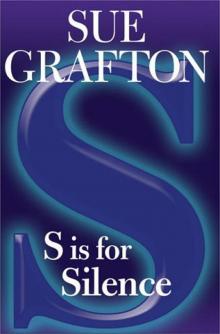 S Is for Silence
S Is for Silence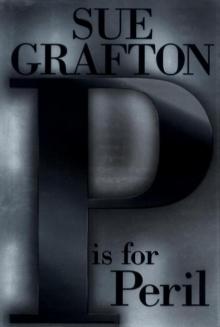 P Is for Peril
P Is for Peril R Is for Ricochet
R Is for Ricochet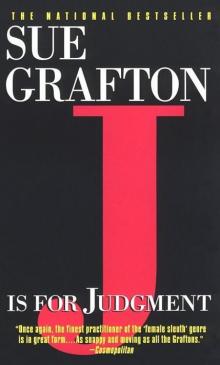 J Is for Judgment
J Is for Judgment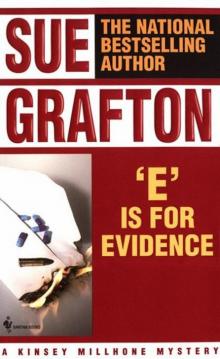 E Is for Evidence
E Is for Evidence T Is for Trespass
T Is for Trespass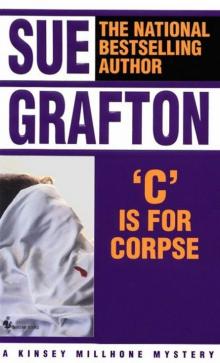 C Is for Corpse
C Is for Corpse U Is for Undertow
U Is for Undertow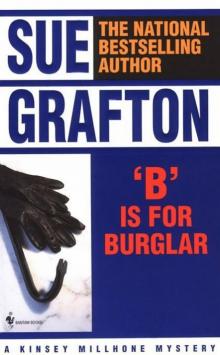 B Is for Burglar
B Is for Burglar Four Sue Grafton Novels
Four Sue Grafton Novels D Is for Deadbeat
D Is for Deadbeat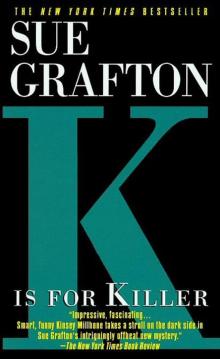 K Is for Killer
K Is for Killer I Is for Innocent
I Is for Innocent A Is for Alibi
A Is for Alibi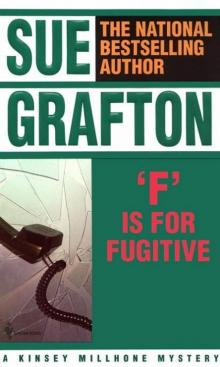 F Is for Fugitive
F Is for Fugitive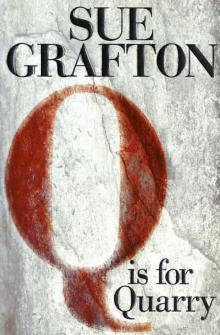 Q Is for Quarry
Q Is for Quarry W Is for Wasted
W Is for Wasted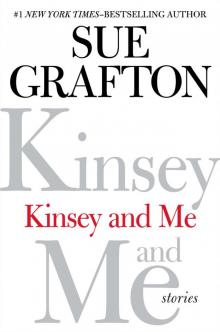 Kinsey and Me: Stories
Kinsey and Me: Stories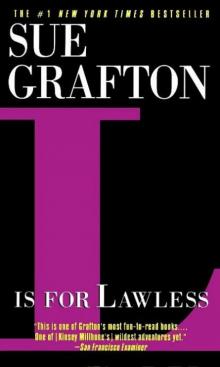 L Is for Lawless
L Is for Lawless Y Is for Yesterday
Y Is for Yesterday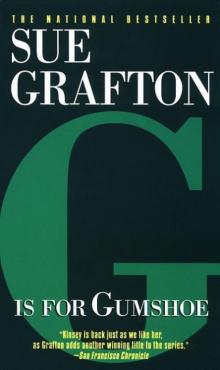 G Is for Gumshoe
G Is for Gumshoe O Is for Outlaw
O Is for Outlaw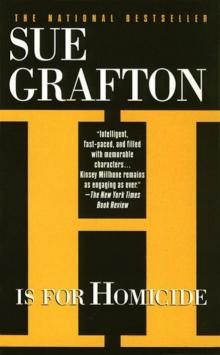 H Is for Homicide
H Is for Homicide X
X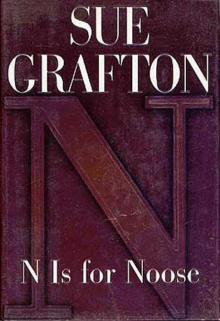 N Is for Noose
N Is for Noose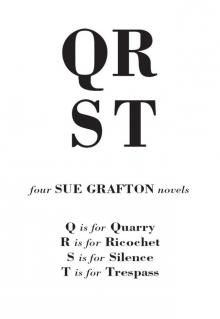 Three Complete Novels: A Is for Alibi / B Is for Burglar / C Is for Corpse
Three Complete Novels: A Is for Alibi / B Is for Burglar / C Is for Corpse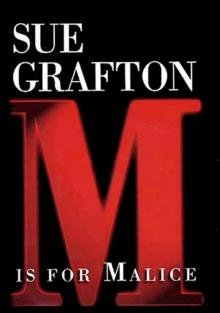 M Is for Malice
M Is for Malice I is for INNOCENT
I is for INNOCENT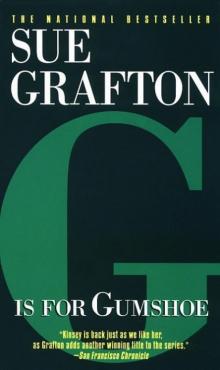 G is for GUMSHOE
G is for GUMSHOE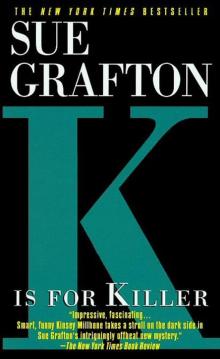 K is for KILLER
K is for KILLER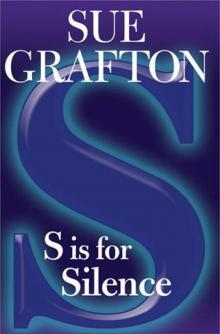 S is for SILENCE
S is for SILENCE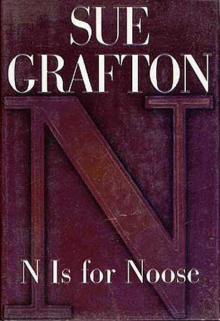 N is for NOOSE
N is for NOOSE D is for DEADBEAT
D is for DEADBEAT V is for Vengeance
V is for Vengeance U is for Undertow
U is for Undertow W Is for Wasted km-23
W Is for Wasted km-23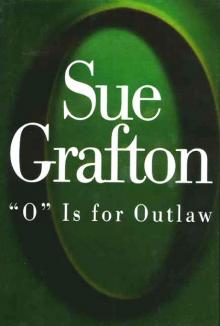 O is for OUTLAW
O is for OUTLAW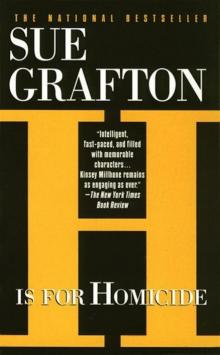 H is for HOMICIDE
H is for HOMICIDE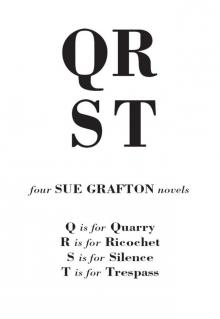 Sue Grafton Novel Collection
Sue Grafton Novel Collection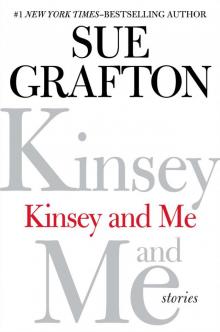 Kinsey and Me
Kinsey and Me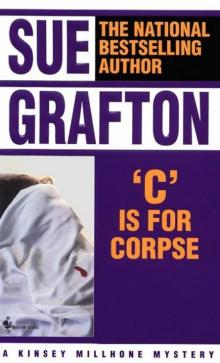 C is for CORPSE
C is for CORPSE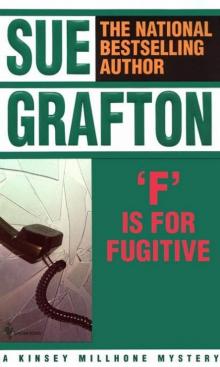 F is for FUGITIVE
F is for FUGITIVE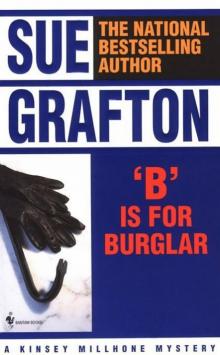 B is for BURGLAR
B is for BURGLAR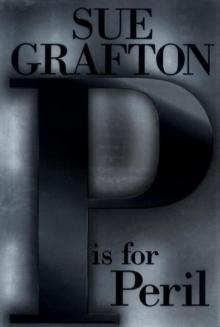 P is for PERIL
P is for PERIL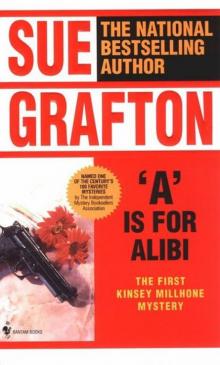 A is for ALIBI
A is for ALIBI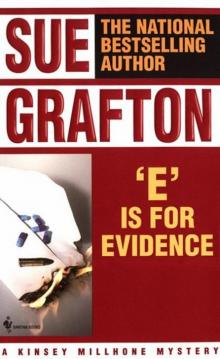 E is for EVIDENCE
E is for EVIDENCE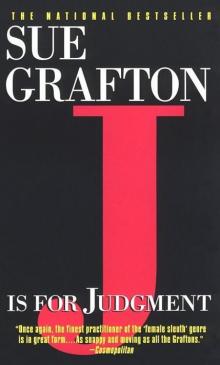 J is for JUDGMENT
J is for JUDGMENT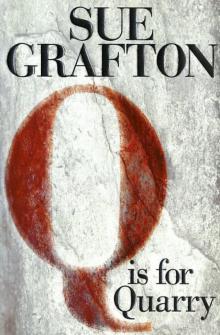 Q is for QUARRY
Q is for QUARRY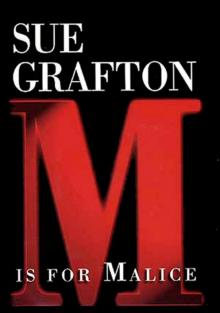 M is for MALICE
M is for MALICE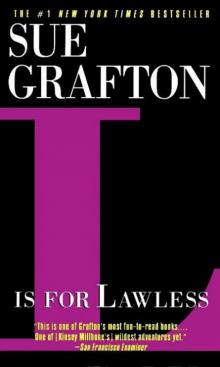 L is for LAWLESS
L is for LAWLESS